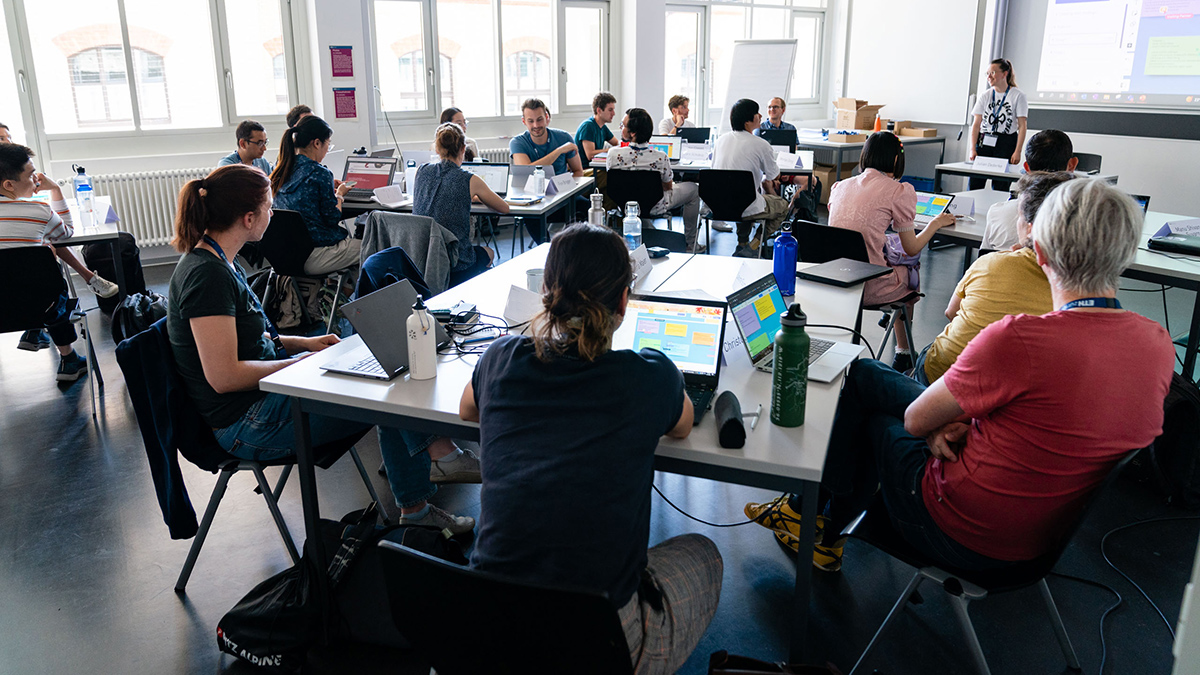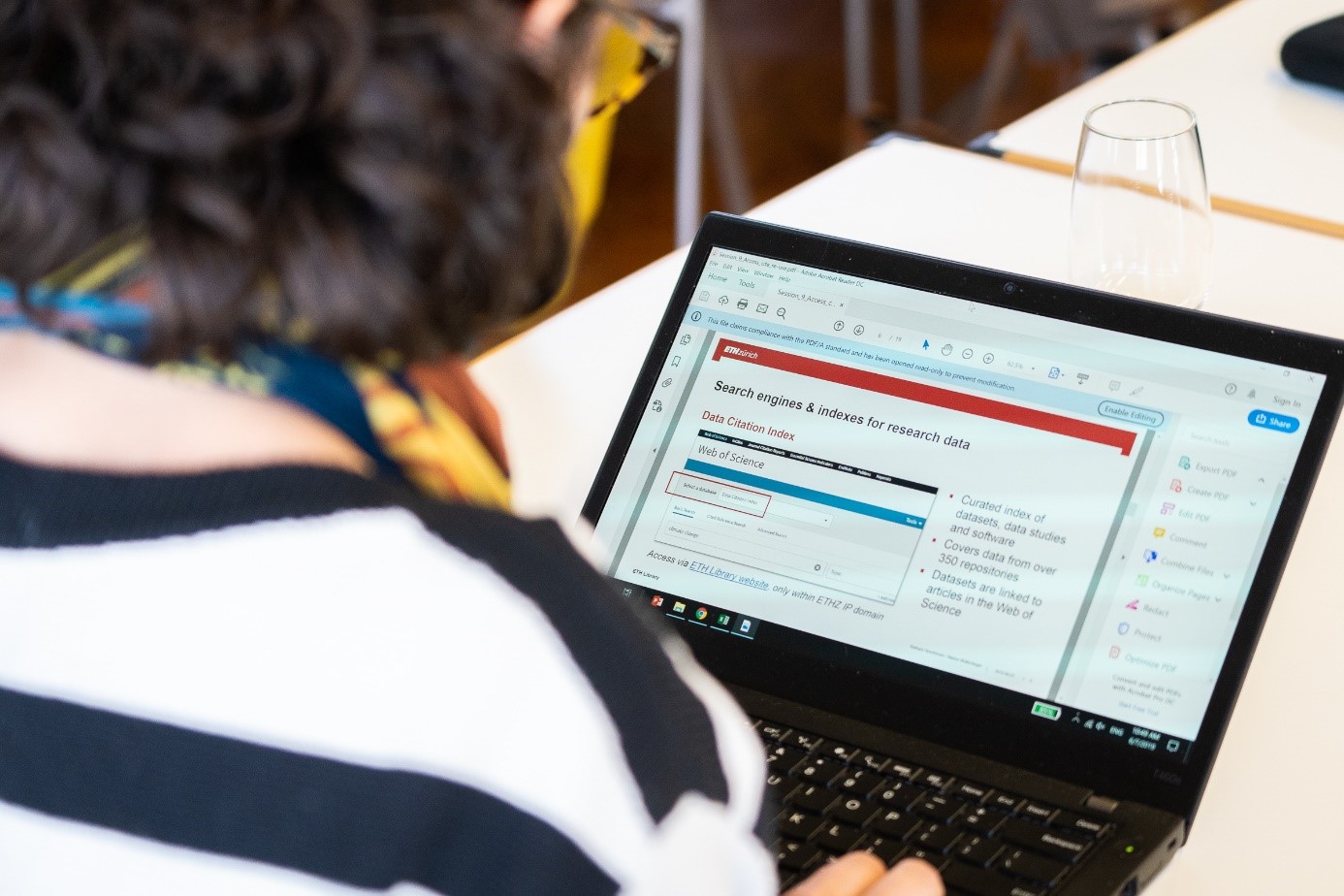ETH Research Data Management Summer School 2024
10 to 14 June 2024

This ETH Summer School is aimed at doctoral students and postdocs within the ETH domain. Other staff in the field of data management or data stewardship may potentially be admitted as well, after consulting with the organisers. The Summer School gives you an extensive overview of research data management (RDM), its principles as well as its practical implications and useful tools for early career scientists. Emphasis is placed on the conditions, infrastructure, and services at ETH Zurich.
RDM is vital to researchers for ensuring the proper organisation of research data along the entire lifecycle from creation to preservation including their sharing as FAIR data. Nowadays, research institutions like ETH Zurich as well as many funding agencies (e.g. SNSF, Horizon Europe) expect good RDM practice throughout the entire project period and a data management plan. The Summer School supports researchers in meeting these requirements.
Sessions
- Broad introduction to research data management and aspects of open science
- Daily data management during the course of a research project
- Reproducible data management and analysis
- Handling confidential and strictly confidential research data
- Open access to publications
- Sharing and publishing research data
- Long-term preservation of research data
Sessions include presentations from ETH experts as well as short inputs from ETH professors and will be complemented by practical workshops, where you can immediately apply the knowledge gained during the sessions. A marketplace at the end of the Summer School offers the possibility of 1:1 consulting to discuss open questions and problems concerning various topics related to research data management. This will also offer the opportunity to get better acquainted with the various expert offices at ETH Zurich.
Workshops
Git is a version control system for managing changes in code over time and coordinating software development within teams. It is a fundamental tool in modern software development.
If your answer to any of the following questions is “yes”, then working with Git may be of interest to you:
- Some of my code files have dates or versions encoded, like “script_abc_from_july_2020.py”.
- I want to undo some change in my code I did e.g. weeks ago.
- I want to compare my current code with a previous version because it stopped working.
- I work on the same code with others.
- I want to publish code on public code repositories, such as github.com or gitlab.com.
Focus of the workshop
The workshop will introduce basic principles, the most useful commands and best practices for working with Git and GitLab/GitHub. It also includes an introduction to working with your computer’s command line/terminal.
Learning objectives
Understanding Git basic principles, what it does, and how and when to use it.
How to publish work on public repositories such as gitlab.com or github.com
Target audience
Researchers who work with programming code or text files.
Prerequisites
No previous knowledge required.
external pageopenBIScall_made is a combined data management platform, electronic laboratory notebook, and inventory management system. openBIS helps scientists to meet requirements from of funding agencies, journals, and academic institutions for publishing data in line with the FAIR data principles. Scientists can use openBIS to document their daily experimental or computational work, store any related experimental raw and derived data, and link everything to materials, samples and protocols stored in the lab inventory. The system ensures safe data storage and provenance tracking.
openBIS is an open source software distributed under the Apache v2.0 licence, developed by ETH Zurich Scientific IT Services (ETH SIS). ETH SIS provides services based on openBIS to research groups at ETH Zurich (https://ethz.ch/staffnet/en/it-services/catalogue/software-business-applications/research-data-management.html) and at other Swiss academic institutions (https://openbis.ch/index.php/openrdm-swiss/).
Learning objectives
In this workshop, we will provide a general overview of openBIS followed by a practical training session.
At the end of the course, the participants are expected to be able to:
- use the openBIS inventory of materials and samples;
- use the openBIS inventory of laboratory protocols;
- document projects and experiments in the openBIS lab notebook and enter data.
Target audience
Experimental scientists working in research labs.
Prerequisites
- Knowledge/competencies
This workshop is designed for beginners and does not require any previous knowledge. - Technical equipment
Participants are required to have their own laptop. An openBIS test server will be made available to participants on the day of the workshop. Recommended web browsers are Firefox, Safari or Chrome.
The course material will be provided a few days before the workshop and participants will be required to download the material onto their laptops and have it ready for use on the day of the workshop.
Want to follow best practices in data management but don’t do not know where to start? Renku’s data management toolkit helps you manage every aspect of your project – data, code, workflows and computational environments – so you can rest easy knowing that someone else (or even yourself six months down the line) could find, understand and reuse your research. Renku ensures traceability by tracking when, how and by whom results were produced. Renku provides single-click access to containerised, interactive computational environments without prior knowledge of underlying technologies. These ready-to-use environments are available in different forms, ranging from Jupyter notebooks and RStudio to fully-fledged desktop sessions running in the browser. Additionally, all of your project metadata is indexed in a searchable knowledge graph.
Focus of the workshop
In this workshop, you will learn how to use Renku to make your research output more Findable, Accessible, Interoperable and Reusable (FAIR).
Learning objectives
Participants will learn:
- how to set up and use Renku to manage data, code, workflows and computational environments;
- how to use containerisation to define and distribute computational environments;
- how to use a reproducibility platform to seamlessly share computational workflows with others.
Target audience
Researchers that develop and run, or want to develop and run, computational workflows for simulations, processing and analysing their data.
Prerequisites
No previous knowledge required.

When and where?
The ETH Research Data Management Summer School 2024 takes place from 10 to 14 June 2024 at ETH Zurich Zentrum campus and is aimed primarily at doctoral students and postdocs from ETH Zurich. Besides ETH Zurich members, doctoral students and postdocs within the ETH domain can participate as well.
Accessibility
Access and participation in our courses will be barrier-free. Please contact us in advance at +41 44 632 21 35 or at so that we can optimally meet your needs.
Participation fee
CHF 250
The participation fee covers all activities, sessions and workshops as well as catering during the Summer School.
Conditions of participation
Doctoral students can obtain 2 ECTS points for the Summer School. Participants must register for the Summer School and complete the program in full to receive the credit points. This includes pre-course work, full presence during lectures and workshops, writing a data management plan, and pitching their current research project.
Registration
external pageTo the registration for the RDM Summer School 2024.call_made

